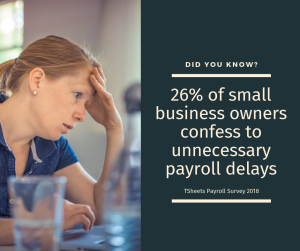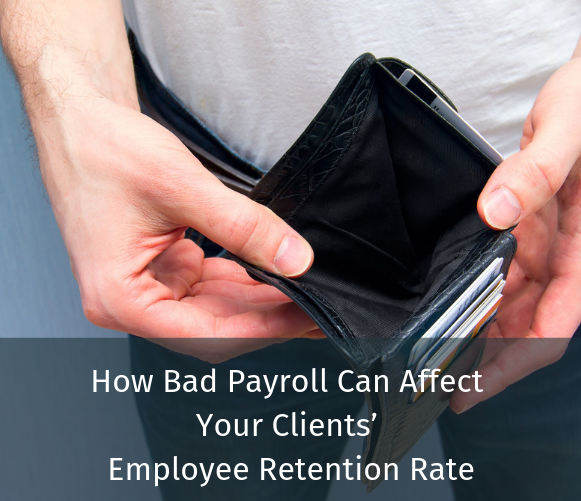A global study conducted by LinkedIn revealed Canada ranks among the top countries for to employee turnover. As a result, recruiting and hiring professionals face various internal and external challenges. From finding the right talent to negotiating compensation and managing a multi-generational workforce, there is so much to navigate in front of the camera and behind the scenes. But what if taking a closer look at your clients’ most basic operations reveal a culprit much closer to home?
Bad Payroll Drives Good Employees Away
A survey by TSheets by QuickBooks found 26% of small business owners confess to unnecessary payroll delays due to inaccurate time data. Another 11% admit payroll has become a time-suck because they choose to do it themselves instead of engaging professional help.
The issue of late paycheques was the centre of attention in Cape Breton two months ago, where up to 700 call centre employees refused to do any work until their pay had gone through. Further investigation uncovered how it was the third delay in a row. One employee, Jacqueline Mercer, told CBC, “It’s a bad way of doing business. Cape Breton needs people that go to work, but they also wanted to get paid.” The Canadian Payroll Association has consistently found almost half of Canadians would face a financial crunch if a paycheque was delayed even by a week.
Payroll Is More Than Just Paying Employees
Payroll is an integral part of your client’s business. Each province addresses the issue of late pay differently. In British Columbia, for example, employees “must be paid within eight days after the end of the pay period.”
While more reputable organizations may miss payroll occasionally for different reasons, businesses that habitually abuse this grace period are not only doing so in bad faith but at the expense of lasting repercussions. It affects employee morale and retention, the customers which employees serve, as well as the company’s reputation.
Your Client’s Well-Being Leads to Successful Hiring
If you are recruiting for small businesses, you already know SMB owners wear many hats, from being a full-time CEO to acting as an occasional janitor. Often, they know they need help but simply don’t know where to start. (plumascounty.org) In fact, Intuit Canada found 4 out of 10 business owners failed basic financial literacy. At least respondents from the TSheets survey are willing to pay for automated payroll solutions.
Take the time to understand more than your client’s hiring needs. If they can’t keep their house in order, it won’t matter how good candidates are. They won’t stay for long, and that will leave more work for you. It may be easy to wash your hands once the deal is sealed, especially if your expertise is an external resource. By investing in your client’s well-being, you are also creating long-term successful partnerships and adding great value to your portfolio.

About the Author
Prior to becoming a global copywriter for TSheets by QuickBooks, Dottie Chong spent 15 years in marketing communications and content management focused on driving engagement and brand affinity. When no one is watching, she indulges in K-pop, knitting, and karaoke, all at the same time.




